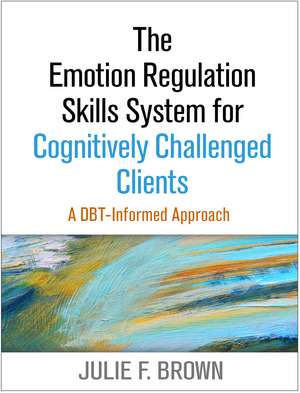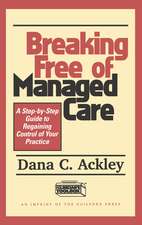The Emotion Regulation Skills System for Cognitively Challenged Clients: A DBT-Informed Approach
Autor Julie F. Brownen Limba Engleză Paperback – 18 ian 2016
Informed by the principles and practices of dialectical behavior therapy (DBT), this book presents skills training guidelines specifically designed for adults with cognitive challenges. Clinicians learn how to teach core emotion regulation and adaptive coping skills in a framework that promotes motivation and mastery for all learners, and that helps clients apply what they have learned in daily life. The book features ideas for scaffolding learning, a sample 12-week group curriculum that can also be used in individual skills training, and numerous practical tools, including 150 reproducible handouts and worksheets. The large-size format facilitates photocopying. Purchasers also get access to a webpage where they can download and print the reproducible materials.
| Toate formatele și edițiile | Preț | Express |
|---|---|---|
| Paperback (1) | 337.62 lei 3-5 săpt. | +35.76 lei 10-14 zile |
| Guilford Publications – 18 ian 2016 | 337.62 lei 3-5 săpt. | +35.76 lei 10-14 zile |
| Hardback (1) | 521.04 lei 6-8 săpt. | |
| Guilford Publications – 20 noi 2019 | 521.04 lei 6-8 săpt. |
Preț: 337.62 lei
Nou
Puncte Express: 506
Preț estimativ în valută:
64.60€ • 67.63$ • 53.46£
64.60€ • 67.63$ • 53.46£
Carte disponibilă
Livrare economică 15-29 martie
Livrare express 04-08 martie pentru 45.75 lei
Preluare comenzi: 021 569.72.76
Specificații
ISBN-13: 9781462519286
ISBN-10: 1462519288
Pagini: 367
Dimensiuni: 203 x 267 x 23 mm
Greutate: 0.79 kg
Ediția:1
Editura: Guilford Publications
Colecția Guilford Press
ISBN-10: 1462519288
Pagini: 367
Dimensiuni: 203 x 267 x 23 mm
Greutate: 0.79 kg
Ediția:1
Editura: Guilford Publications
Colecția Guilford Press
Public țintă
Professional and Professional Practice & DevelopmentCuprins
1. Introducing the Skills System
2. Learning the Skills System
3. Theoretical Underpinning of the Skills System
4. Structuring Skills System Instruction
5. Foundational Teaching Strategies
6. E-Spiral Teaching Strategies
7. Skills System 12-Week-Cycle Curriculum
8. Skills Coaching Techniques
Appendix A. Skills System Handouts and Worksheets
Appendix B. Skills Plan Map
Appendix C. Skills Coaching Worksheets
References
2. Learning the Skills System
3. Theoretical Underpinning of the Skills System
4. Structuring Skills System Instruction
5. Foundational Teaching Strategies
6. E-Spiral Teaching Strategies
7. Skills System 12-Week-Cycle Curriculum
8. Skills Coaching Techniques
Appendix A. Skills System Handouts and Worksheets
Appendix B. Skills Plan Map
Appendix C. Skills Coaching Worksheets
References
Notă biografică
Julie F. Brown, MSW, PhD, is Director of Program Development at Justice Resource Institute's Integrated Clinical Services in Rhode Island. She is an independent social worker who has practiced in the intellectual disabilities field for over two decades. Since 2005, Dr. Brown has been a dialectical behavior therapy (DBT) trainer with Behavioral Tech, LLC. She received the Leadership Award from the American Association on Intellectual and Developmental Disabilities. Her website is www.skillssystem.com.
Recenzii
“Buy this book and you will return to it again and again. Brown’s Skills System offers a concise, ultra-pragmatic skills training approach with comprehensive, step-by-step curriculum materials great for teaching emotion regulation to learners of all abilities. Both experienced and novice skills trainers will love this toolkit of teaching strategies!”--Kelly Koerner, PhD, Evidence-Based Practice Institute, Seattle
"This is an exceptionally useful curriculum for all practitioners who work with individuals who have intellectual impairments co-occurring with significant challenging behaviors. Brown's approach to DBT skills training has been demonstrated to be very helpful for treating emotional dysregulation while accommodating this population's complex needs. An important and insightful book."--Robert J. Fletcher, DSW, ACSW, Founder and CEO, NADD (National Association for the Dually Diagnosed)
"Brown provides a clear, step-by-step introduction to the emotion regulation skills curriculum that she has developed over two decades of work with individuals with learning challenges and emotional difficulties. Brown succeeds admirably where few others have even dared to set foot. Complex emotion regulation challenges are broken down into manageable problems using a series of steps that people at many different skill levels can apply. At once simple and sophisticated, this guide is a 'must.'"--James J. Gross, PhD, Department of Psychology, Stanford University
"Brown has masterfully integrated and adapted key DBT elements into her Skills System. With a growing evidence base, accessible language, easy graphics, and welcome repetition, her manual promises to help countless people with intellectual challenges. I have seen the very positive impact of her work professionally, and so can recommend her book enthusiastically."--Alan E. Fruzzetti, PhD, Professor and Director, Dialectical Behavior Therapy and Research Program, Department of Psychology, University of Nevada, Reno
"In this much-needed volume, Brown expertly translates basic concepts from DBT, using simple language, clear handouts, appealing visual icons, and inviting worksheets. Her curriculum helps individuals to regulate emotions, thoughts, and behaviors based on their level of emotional arousal and the situation. Brown's use of simple terms such as Clear Picture, On-Track Thinking, On-Track Action, and New-Me Activities facilitates skills acquisition, and the week-by-week teaching guide provides skills trainers with a user-friendly structure to implement the program. Especially helpful to the reader is Brown's discussion of multiple theoretical models that form the foundation of the Skills System."--Jill H. Rathus, PhD, Department of Psychology, Long Island University–C. W. Post Campus
"This book is a clinically sensitive, research-informed presentation of how DBT skills training can be employed with clients with intellectual challenges. Detailed descriptions of training sessions are accompanied by user-friendly handouts and worksheets. All professionals working with this population will benefit from this thoughtful work. Kudos to Julie Brown!"--Donald Meichenbaum, PhD, Distinguished Professor Emeritus, University of Waterloo, Canada; Research Director, The Melissa Institute for Violence Prevention, Miami, Florida
“Anyone attempting to teach emotion regulation skills to individuals with intellectual challenges must read this user-friendly book, since many of the standard manuals miss the mark with this population. Brown’s vast clinical wisdom shines through in her developmentally appropriate teaching examples, discussion points, and handouts.”--Alec L. Miller, PsyD, Department of Psychiatry and Behavioral Sciences, Albert Einstein College of Medicine
"If you are doing DBT-informed work with an individual with serious cognitive challenges or intellectual disabilities, this is the book for you. Brown has been a DBT trainer since 2005 and has adapted the skills for the special needs of this population."--Marsha M. Linehan, PhD, ABPP, Professor and Director Emeritus, Behavioral Research and Therapy Clinics, University of Washington; developer of DBT
"I use Brown's approach with individuals who are not cognitively challenged but struggle with addiction. They find the terms easy to remember and consistent with recovery concepts. The straightforward, concrete structure of the system is helpful for clients who feel lost and vulnerable during their recovery. I recommend this book for any clinician who wants to teach emotion regulation skills."--Michele Waldron, PsyD, LADC-I, private practice, Bedford, Massachusetts
-The user-friendly features of this book stand out as a strength among other guides and manuals aimed at adapting DBT materials. Practitioners are provided with a twelve-week curriculum, as well as ideas for alternate formats. Appendixes A, B, and C include more than 150 pages of reproducible handouts, working examples, and coaching worksheets, many of which include helpful illustrations. Readers are also given a link to access a printable copy of all supplemental materials online, making this manual a valuable tool for those seeking a structured approach to skills training with clients who experience learning challenges.--School Social Work Journal, 4/2/2018"This is an exceptionally useful curriculum for all practitioners who work with individuals who have intellectual impairments co-occurring with significant challenging behaviors. Brown's approach to DBT skills training has been demonstrated to be very helpful for treating emotional dysregulation while accommodating this population's complex needs. An important and insightful book."--Robert J. Fletcher, DSW, ACSW, Founder and CEO, NADD (National Association for the Dually Diagnosed)
"Brown provides a clear, step-by-step introduction to the emotion regulation skills curriculum that she has developed over two decades of work with individuals with learning challenges and emotional difficulties. Brown succeeds admirably where few others have even dared to set foot. Complex emotion regulation challenges are broken down into manageable problems using a series of steps that people at many different skill levels can apply. At once simple and sophisticated, this guide is a 'must.'"--James J. Gross, PhD, Department of Psychology, Stanford University
"Brown has masterfully integrated and adapted key DBT elements into her Skills System. With a growing evidence base, accessible language, easy graphics, and welcome repetition, her manual promises to help countless people with intellectual challenges. I have seen the very positive impact of her work professionally, and so can recommend her book enthusiastically."--Alan E. Fruzzetti, PhD, Professor and Director, Dialectical Behavior Therapy and Research Program, Department of Psychology, University of Nevada, Reno
"In this much-needed volume, Brown expertly translates basic concepts from DBT, using simple language, clear handouts, appealing visual icons, and inviting worksheets. Her curriculum helps individuals to regulate emotions, thoughts, and behaviors based on their level of emotional arousal and the situation. Brown's use of simple terms such as Clear Picture, On-Track Thinking, On-Track Action, and New-Me Activities facilitates skills acquisition, and the week-by-week teaching guide provides skills trainers with a user-friendly structure to implement the program. Especially helpful to the reader is Brown's discussion of multiple theoretical models that form the foundation of the Skills System."--Jill H. Rathus, PhD, Department of Psychology, Long Island University–C. W. Post Campus
"This book is a clinically sensitive, research-informed presentation of how DBT skills training can be employed with clients with intellectual challenges. Detailed descriptions of training sessions are accompanied by user-friendly handouts and worksheets. All professionals working with this population will benefit from this thoughtful work. Kudos to Julie Brown!"--Donald Meichenbaum, PhD, Distinguished Professor Emeritus, University of Waterloo, Canada; Research Director, The Melissa Institute for Violence Prevention, Miami, Florida
“Anyone attempting to teach emotion regulation skills to individuals with intellectual challenges must read this user-friendly book, since many of the standard manuals miss the mark with this population. Brown’s vast clinical wisdom shines through in her developmentally appropriate teaching examples, discussion points, and handouts.”--Alec L. Miller, PsyD, Department of Psychiatry and Behavioral Sciences, Albert Einstein College of Medicine
"If you are doing DBT-informed work with an individual with serious cognitive challenges or intellectual disabilities, this is the book for you. Brown has been a DBT trainer since 2005 and has adapted the skills for the special needs of this population."--Marsha M. Linehan, PhD, ABPP, Professor and Director Emeritus, Behavioral Research and Therapy Clinics, University of Washington; developer of DBT
"I use Brown's approach with individuals who are not cognitively challenged but struggle with addiction. They find the terms easy to remember and consistent with recovery concepts. The straightforward, concrete structure of the system is helpful for clients who feel lost and vulnerable during their recovery. I recommend this book for any clinician who wants to teach emotion regulation skills."--Michele Waldron, PsyD, LADC-I, private practice, Bedford, Massachusetts
Descriere
Informed by the principles and practices of dialectical behavior therapy (DBT), this book presents skills training guidelines specifically designed for participants with cognitive challenges.














